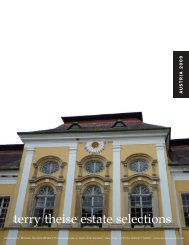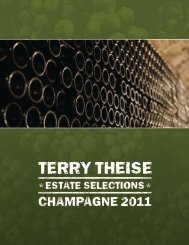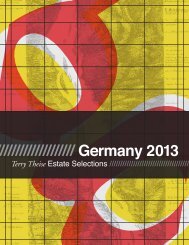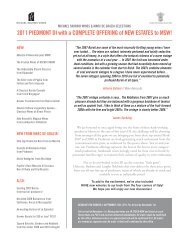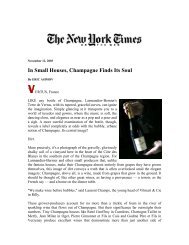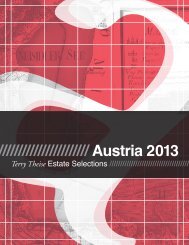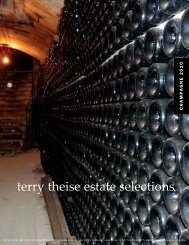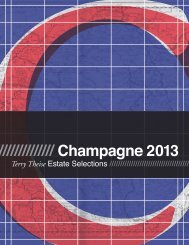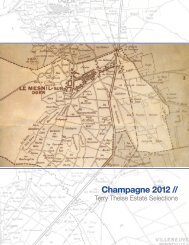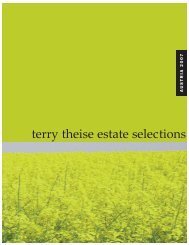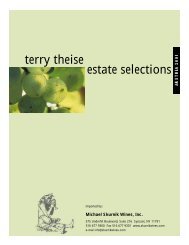German Catalog 2006 USE THIS ONE.qxp - Michael Skurnik Wines
German Catalog 2006 USE THIS ONE.qxp - Michael Skurnik Wines
German Catalog 2006 USE THIS ONE.qxp - Michael Skurnik Wines
Create successful ePaper yourself
Turn your PDF publications into a flip-book with our unique Google optimized e-Paper software.
RHEINHESSEN WINES<br />
122<br />
j.u.h.a. strub<br />
rheinhessen • nierstein<br />
I called Walter Strub to tell him I’d be arriving for Hans Selbach’s funeral. I’d stop off in Nierstein<br />
for tea and breakfast, drive on to the Mosel, and return in the evening to hang out.<br />
A few days later, on the eve of my departure Walter called to say he’d drive me to the funeral.<br />
I was so touched I could hardly bear it. First that he wanted to pay his own respects. Second<br />
that he wanted to spare me the jet-lagged drive. Third that he created an occasion where we two<br />
could be alone together to talk.<br />
Walter is shy at full-frontal emotionality, so I have to say these things here, to you, knowing<br />
he’ll read them on the couch some evening by himself, and not be embarrassed. This is a friend.<br />
In the late Winter of 1983 I made one final trip to the<br />
Rheinland to say goodbye to some close friends. I’d be<br />
heading back to the States a few weeks later, after ten years<br />
in <strong>German</strong>y. One of those friends was Walter Strub, who<br />
asked if I’d have some time to taste his young vintage 1982<br />
with him. I agreed readily; I wasn’t in the wine trade then,<br />
and had no experience tasting pre-bottled wine.<br />
The samples were lined up when I arrived. Most of<br />
the wines were bone-dry or nearly so, and the question<br />
arose how sweet they should ultimately be. The Trocken<br />
fetish was only incipient in those days. Well yours truly<br />
had no earthly idea how sweet the wines should be; I’d<br />
never looked at an analysis and had no idea how many<br />
grams-per-liter of sweetness equaled what impression of<br />
sweetness on the palate. Walter gave me an ‘81 to taste<br />
and told me how sweet it was, and I tried using that wine<br />
as a benchmark.<br />
The work came easily to me—to my great surprisebut<br />
this was another order of tasting, different in essence<br />
from anything I’d tasted or drank as a “civilian.” It was<br />
one thing to<br />
have tasted<br />
finished<br />
wines analytically,<br />
that was<br />
recreation,<br />
but this was<br />
intuition,<br />
inference,<br />
imagination,peering<br />
through<br />
a periscope<br />
into the<br />
future, not<br />
to mention the finished wine depended on making the<br />
right choice now.<br />
Even after doing it for twenty-plus years now, it’s<br />
still hard to articulate what it entails. I’m afraid it’s very<br />
Zen. You receive a wine which may or may not be incom-<br />
•Vineyard area: 15 hectares<br />
•Annual production: 7,500 cases<br />
•Top sites: Niersteiner Orbel, Oelberg,<br />
Hipping and Pettenthal<br />
•Soil types: Red clay, slate, loess, loam & chalk<br />
•Grape varieties: 80% Riesling, 13% Müller-<br />
Thurgau, 3% Grüner Veltliner, 2%<br />
Weissburgunder and Spätburgunder<br />
plete (some of them are instantly perfect just as they are)<br />
and you infer what it will take to complete them. In so<br />
doing you are required to examine flavor components<br />
under a palate-microscope. But it happens in a flash, it<br />
takes longer to explain it than to do it, and it isn’t consciously<br />
cognitive. You relax, so the wine can come to<br />
you, and when it does you flash a beam of super-attention<br />
on it. Then you judge and cogitate. And I think I’m<br />
good at it, but still I am often wrong. I like being wrong.<br />
Because if I’m wrong (i.e., if my initial guess doesn’t pan<br />
out), I get to keep at it till I get it right, and I get to see my<br />
error, and it’s the best way to learn.<br />
I’ve learned a few things over the years. More sugar<br />
doesn’t always taste sweeter. Often it’s the opposite.<br />
What tastes perfect in the lab needs more sweetness at<br />
bottling, because bottling constricts fruit and body and<br />
emphasizes acidity, and because sugars begin to polymerize<br />
immediately. If a wine’s a bit too sweet, time will<br />
see to it. If it’s too dry, ain’t nuthin’ you can do.<br />
Here’s why I’m going on about this in a text about<br />
Walter Strub. Because of the many layers of trust he<br />
showed me, out of the goodness of his heart. He invited<br />
me behind the scenes, allowing me to see his wines au<br />
naturel, and to taste as I’d never tasted before. And to my<br />
astonishment, he took my ideas seriously. But that’s<br />
Walter: no secrets, no artifice, full of the spirit of sharing.



